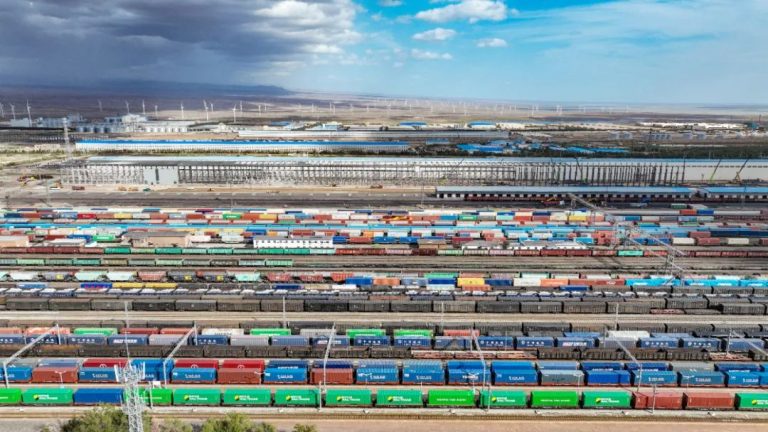
According to Jiang Yunlong, and Wen Suwei, Northwest China’s Xinjiang Uygur autonomous region, located at the heart of the Eurasian continent, sees the most land ports as a provincial-level region in China. It plays an irreplaceable role in the development of the Silk Road Economic Belt.
In Xinjiang, it takes only 0.08 hours for cargo to complete customs clearance through the Alashankou railway port; the number of China-Europe freight trains departing from and arriving in Horgos has increased with an annual growth of 81 percent; foreign trade volume of the autonomous region exceeded 250 billion yuan ($34.44 billion) in the first three quarters this year, reaching a historical high.
In recent years, with China’s efforts to expand opening up, develop its western region, and promote the Belt and Road Initiative, Xinjiang has transformed from a relatively closed inland area to a frontier of opening up.
Not long ago, China’s State Council issued a general plan for establishing the Xinjiang Pilot Free Trade Zone (FTZ), further promoting Xinjiang’s high-level opening up and writing a new chapter in the autonomous region’s engagement with the outside world.
Recently, a China-Europe freight train departed from Xinjiang’s Alashankou, also known as Alataw Pass, for Kazakhstan.
“We send polyvinyl chloride materials and solar cells out and take wheat, edible oil, and minerals back to China,” said Guan Xizhi, driver of the train. Thanks to the continuous improvement in transport efficiency, the frequency of the China-Europe freight service has also increased in recent years, Guan added.
It is learned that the Alashankou railway port has introduced a “24/7” appointment-based customs clearance mechanism to ensure quick inspection, verification, and release. This helps minimize the time for customs clearance and significantly reduces transportation costs.
Since the freight service was launched in 2011, the number of China-Europe freight trains leaving and entering China via the Alashankou Port has surpassed 30,000. Nearly 6,000 trips are made a year now, up from 17 in the beginning, connecting 25 Chinese provincial-level regions to some 20 countries to the west.
At present, a network covering over 110 routes has been formulated. More than 200 categories of goods are currently being transported along these routes, including automobiles, auto parts, cotton yarn, and timber.
“Reaching Europe via Alashankou is the international trade channel with the shortest distance, the least time, and the lowest freight cost on the Silk Road Economic Belt,” said Li Jianglin, executive deputy mayor of the city.
At the Horgos highway port, trucks are often seen lining up. As of Nov. 3 this year, the number of vehicles exported through this port reached 101,100, a year-on-year increase of 177.3 percent. The highest daily export of vehicles reached 1,301 units, showing exponential growth.
“Chinese vehicles, especially new energy vehicles, have become a new highlight of Xinjiang’s foreign trade,” said Hu Laijie, director of the port management bureau of the Horgos economic development zone.
Currently, 35 Chinese carmakers export vehicles through the Horgos highway port, and there are over 80 vehicle export agencies, according to Hu. He said Chinese vehicles are exported via the port to Kazakhstan, Uzbekistan, Russia, and other Belt and Road countries.
“I believe I can find ‘gold’ in the ‘desert,'” said He Haiyan, who came to Alashankou from her hometown Shaanxi province to start a business.
Today, her three small counters have blossomed into a 275-square-meter cross-border e-commerce store. Stepping into the store, visitors are greeted by a dazzling array of imported goods that entice them to fill their shopping carts and spend hours exploring the vast selection.
To support the development of cross-border e-commerce and leverage the advantages of the Alashankou port and the Alashankou Comprehensive Bonded Zone, the city has established a 28,000-square-meter sorting and customs clearance center. Renowned e-commerce platforms such as Alibaba, Amazon, and eBay have settled in the city, providing services to 508,000 e-commerce enterprises.
“We have pioneered an innovative ‘slow air transportation’ model, enabling exported goods to reach Europe within 12 to 18 days, at a cost of only 1/5 of regular air transportation and 1/6 of the time taken by sea freight,” said Zhou Chong, deputy director of the management committee of the Alashankou Comprehensive Bonded Zone.
The local authorities have implemented an efficient and fast customs clearance process, prioritizing the declaration, sealing, and inspection of cross-border e-commerce goods, Zhou added.
In addition to numerous cross-border e-commerce enterprises, there is also a fantastic destination for shopaholics in Horgos-the China-Kazakhstan Horgos International Border Cooperation Center. Spanning an area of 3.43 square kilometers on the Chinese side and 2.17 square kilometers on the Kazakh side, this center offers visitors 30 days of visa-free cross-border facilitation.
Entering into the Chinese side of the center, each visitor is allowed to carry 8,000 yuan worth of duty-free goods per day. The center received an average of 24,000 visitors per day from January to September this year.
“The demand for shops is so high that as soon as one becomes available, it is immediately snatched up by eager tenants,” said Ji Gang with the cooperation center.
As the autonomous region becomes more open, ports in Xinjiang are thriving, said Hao Weiming, head of Urumqi Customs. He believes that by taking the establishment of Xinjiang Pilot FTZ as an opportunity, the high-quality development of Xinjiang’s open economy will surely reach a new level.










